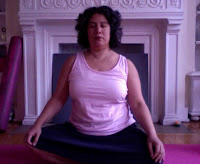My cousin-once-removed asked me about meditation, so here’s my story. I started with guided meditation when I was in my mid-twenties. I liked listening to someone else’s voice as it led me through a visualization exercise that helped me relax and feel completely peaceful, if only for twenty minutes or so. I still very much enjoy that. It helped me with stress and the chronic depression I manage. Guided meditiation made me feel better when things felt out of control.
Meditation has always been an important tool for managing my anxiety and depression symptoms. It’s also helped me improve my self-esteem and reach other goals. Research shows that it improves health, even after you’ve stopped doing it. This is good because I’ve been very uneven with my meditation practice. I’ve quit many times and then come back to it.
In the past 25 years — during the times I hadn’t quit — I moved from guided meditation to the blank mind kind of meditation. I sit, let go of everything that’s been on my mind, and allow my brain to come to rest. It’s kind of like cultivating that blankness you go to when you’re trying to fall asleep. As a result, I’ve done a lot of falling asleep while meditating. This was particularly embarassing when I used to attend a Shambhala center and meditated in a silent room full of people. I’d start nodding off and have to snap myself back to an upright sitting position. Ugh. We also did a walking meditation which was a little better. At least it kept me awake.
Of course keeping my mind blank happens for only a few seconds at a time, even after decades of practice. Some call the chatter that streams through our heads “monkey mind” and it’s hard to calm down. I’ve experimented with long periods of guided meditation (over an hour), short periods of guided meditation (10 minutes), short periods of blank-mind meditation (my term), long periods of blank-mind meditation. I’ve never settled on just one way to do it.
 In 2013 I discovered the meditation practice of Dr. Joe Dispenza and I devoted myself to his techniques for a while. I’ve read this book a couple of times and learned a lot from it. My first breakthrough experience with his guided meditation helped me with anger at my mother and another one came right after attending one of his workshops.
In 2013 I discovered the meditation practice of Dr. Joe Dispenza and I devoted myself to his techniques for a while. I’ve read this book a couple of times and learned a lot from it. My first breakthrough experience with his guided meditation helped me with anger at my mother and another one came right after attending one of his workshops.
But readers of this blog know that I put on a bunch of weight when my marriage fell apart and have been trying to lose it, and I’ve been using the Dispenza technique on that (for a couple of years) and it hasn’t been working. So, in frustration, I stopped meditating again earlier this year.
As my pattern goes, these days I’m coming back to it. With Dispenza I’d sit in meditation for 45-60 minutes a day. Now I’m just doing six-minute periods. My strategy is that if I tell myself it’s just six minutes, I’ll do a better job of focusing. I think it works, which means I actually achieve peace for about five seconds per session. Yeah, there’s no short cut to meditation, but if you practice regularly monkey mind does get easier to tame.
While I don’t have many physical challenges, such as high blood pressure or arthritis, I can list a few clear benefits I’ve received from meditation, even though I’ve only done it off-and-on over the past 25 years:
1. It helps me manage depression, if only by turning my self-destructive mind off for a little while.
2. It gives me an energy boost in the middle of the day, kind of like a power nap.
3. When I meditate regularly, I eat less junk. My sugar cravings go down.
4. I can use it to fall asleep at night.
5. Guided meditation has been very effective at helping me solve problems, improve self-esteem and release emotions that were keeping me stuck.
6. It adds stillness and peace to my routine and I LOVE stillness and peace.
Maybe I’ll always meditate off-and-on, feeling the benefits for a while, then getting mad because it’s not working on everything and tossing it out the window for a while. I don’t go around telling friends that they should do it because I know (very well) that it takes commitment and isn’t for everyone. Meditation means sitting (or walking) and doing nothing. That’s actually a great non-activity to add to your schedule, but this is the U.S. and Americans hate having our minds unoccupied and doing nothing. So that means meditating is going against the grain, which works for me.
